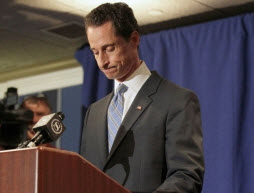 Rep. Anthony Weiner (D-New York) got caught in his own web of lies…or perhaps he lied himself into a corner. Either way, his juvenile behavior, coupled with his terrible judgment, left everyone stunned.
Rep. Anthony Weiner (D-New York) got caught in his own web of lies…or perhaps he lied himself into a corner. Either way, his juvenile behavior, coupled with his terrible judgment, left everyone stunned.
During his show, news anchor and political commentator Chris Matthews described an interesting political term called “rolling disclosure,” where you roll and roll and roll, successfully skirting the issue until you are cornered and have no choice but to admit fault. In the world we used to live in, Weiner may have been able to roll long enough to get away with his antics. But not in the world we live in today—the world of Twitter, FaceBook, You Tube, and instant messaging. It’s a world where anyone can take a photo of you anywhere at any time, and within seconds that photo can be posted online and seen by millions. This gives new meaning to the term world wide web—there’s simply nowhere to hide. Weiner got caught in a spinneret of his own making. And even though spiders can digest their own webbing, it looks like his is caught in his throat.
Is Weiner’s behavior a breach of our constitution? Probably not. But in our new world where nothing is hidden, our leaders would be wise to abide by the oldest of leadership values: honesty. Weiner’s immediate and long-term credibility and reputation were heavily damaged by his response to the crisis. He could have admitted his mistake, taken responsibility, and acted with the strong principles we would all like to believe he had…but he didn’t.
What did he do instead? He denied his involvement. He blamed the messenger. He mounted a full investigation. He dragged his wife into the spotlight. He lied. Yes, in his press conference he accepted full responsibility for what he had done, but by then it was too late. His reputation, his credibility, and his trust had all evaporated. He embarrassed his supporters, his constituents, his colleagues, his family and friends—but mostly he embarrassed himself.
What would “better” look like when it comes to crisis management? What could Weiner have done differently?
I’ll take the high road for just a moment and say that if you are a leader—political, corporate, or otherwise—the first line of defense in crisis management is to resist indiscretion to begin with. As the old Chinese proverb states, “If you don’t want anyone to know, don’t do it.” Remember, you are in a position of power because people believed that you were responsible and honorable. But we’re all human and we all make mistakes.
If you ever find yourself in the position of needing to do some crisis management, here are a few timely tips to follow to do it the right way:
- Face the situation fast. Don’t wait until the situation grows and becomes worse. Address it immediately. History has taught us that the sooner you take action, the less severe the consequences.
- Don’t blame others. Blaming others for something they didn’t do not only hurts that person’s reputation; it also severely damages your credibility when the truth becomes known (and it will become known). When you cast blame for something you did, it makes you look guiltier and more out of control—and more irresponsible.
- Apologize sincerely. A heartfelt, “I’m sorry” goes a long way. Therefore, apologize to all parties and explain what happened to the best of your ability. People want to hear your story—the real story.
- Face the consequences. Getting caught is never fun and always comes with consequences, so be responsible and face them. When you openly and consistently communicate from the start, the consequences will often be less harsh.
- Hold back the tears. No matter how emotional or embarrassed you may feel, do your best not to cry in public. Tears don’t earn you any sympathy.
- Have a strategy for action. Make a plan right away for how you will rectify the situation…and communicate that plan. Answer the following: What can I do to make this better? How can I make up to those who I’ve hurt with my thoughtless, impulsive indiscretion? What is my long-term recovery and restoration plan? How will I redeem myself?
No one wants to be in a position of ever needing to employ a crisis management strategy in their professional life. Fortunately, when you have an example like this, it’s easy to see a better course of action than the one Weiner followed. So if there is some good that will come out of this, it’s a cautionary tale for us all: Lead with integrity, but if you fall, admit it quickly and take the consequences.




